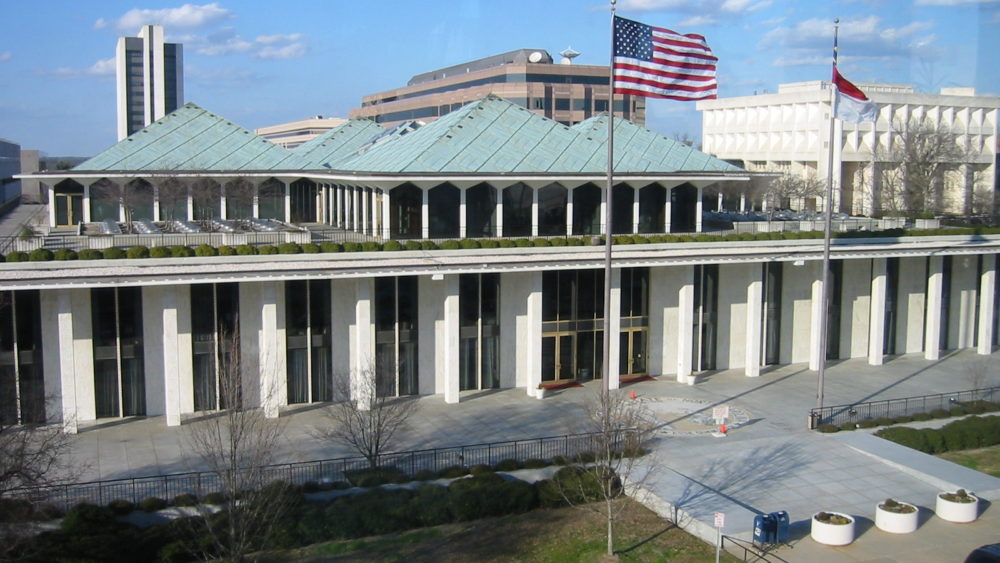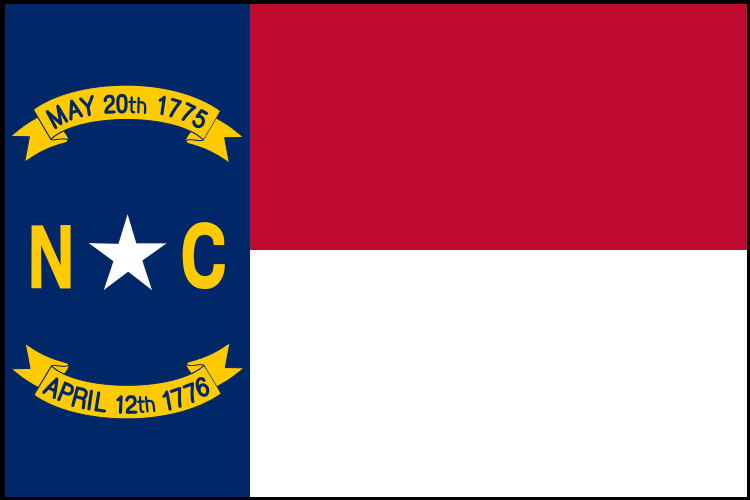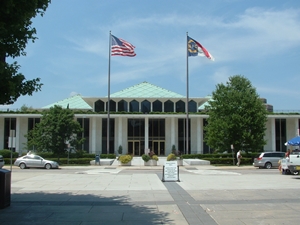December 10, 2021 •
Supreme Court Delays Primary Over Redistricting Lawsuits

North Carolina State Legislative Building
The North Carolina Supreme Court ordered the 2022 primary elections be delayed two months from March 8 to May 17. The order comes in response to lawsuits filed challenging the recently approved redistricting maps. The order also suspends candidate filing […]
The North Carolina Supreme Court ordered the 2022 primary elections be delayed two months from March 8 to May 17.
The order comes in response to lawsuits filed challenging the recently approved redistricting maps.
The order also suspends candidate filing until the litigation is resolved.
The Supreme Court also stated the lawsuits must be heard and ruled upon by January 11, citing the need for urgency in resolving the matter.
November 19, 2019 •
North Carolina Lawmakers Redraw State’s Congressional Map
A replacement map for North Carolina’s congressional districts was finalized with new lines drawn to address alleged extreme partisan bias. The map was redrawn after state judges blocked lines drawn in 2016 from being used next year. The judges ruled […]
A replacement map for North Carolina’s congressional districts was finalized with new lines drawn to address alleged extreme partisan bias.
The map was redrawn after state judges blocked lines drawn in 2016 from being used next year.
The judges ruled there was enough evidence of partisan gerrymandering to make it likely that the 2016 map violated the state constitution.
The voters whose legal challenge led to the new map went to court immediately to oppose the newly drawn map.
However, the North Carolina Supreme Court refused to fast-track the redistricting appeal.
Without a bypass to the state Supreme Court, any appeal would have resulted in a lengthy process that would likely not have been resolved until the 2020 elections were over, making a ruling largely moot.
October 9, 2018 •
North Carolina Proposed Constitutional Amendment Concerns Board of Elections and Ethics Enforcement
North Carolina will vote on a constitutional amendment to establish an eight-member Bipartisan Board of Elections and Ethics Enforcement in November. A 2017 law establishing an eight-member board was struck down by the North Carolina Supreme Court because it reduced […]
 North Carolina will vote on a constitutional amendment to establish an eight-member Bipartisan Board of Elections and Ethics Enforcement in November.
North Carolina will vote on a constitutional amendment to establish an eight-member Bipartisan Board of Elections and Ethics Enforcement in November.
A 2017 law establishing an eight-member board was struck down by the North Carolina Supreme Court because it reduced the governor’s executive authority and failed to provide representation for unaffiliated voters.
If the amendment passes, majority and minority leaders of the legislature would nominate potential members from which the governor would choose.
March 8, 2018 •
Judges Rule on Bipartisan North Carolina Elections-Ethics Board
A North Carolina Superior Court three-judge panel kept in place the recently merged bipartisan state board of elections and ethics enforcement but voided a portion of the law regulating how members would be appointed to that board. The ruling was […]
 A North Carolina Superior Court three-judge panel kept in place the recently merged bipartisan state board of elections and ethics enforcement but voided a portion of the law regulating how members would be appointed to that board.
A North Carolina Superior Court three-judge panel kept in place the recently merged bipartisan state board of elections and ethics enforcement but voided a portion of the law regulating how members would be appointed to that board.
The ruling was in response to a mandate from the North Carolina Supreme Court after they held the membership of and appointment to the bipartisan board was a separation of powers violation.
In response to the Supreme Court’s holding, lawmakers passed House Bill 90 giving the governor the authority to fire any member of the board, so long as he fills the spot with a member from the same party. The bill also allows the governor to appoint a ninth, unaffiliated member, to avoid deadlock.
Gov. Cooper said publicly he would let House Bill 90 become law without his signature, despite his disagreement with it.
Additionally, he has filed a motion with the North Carolina Supreme Court challenging the three-judge panel’s decision and seeking clarity regarding the scope of the Supreme Court’s January holding, which affects the validity of House Bill 90 if it becomes law.
February 15, 2018 •
North Carolina General Assembly Adjourns Legislative Session
The North Carolina General Assembly adjourned its reconvened session on Tuesday, February 13. Lawmakers passed a single piece of legislation, House Bill 90. The bill reduces class-sizes for kindergarten through third grade in addition to changing the makeup of the […]
 The North Carolina General Assembly adjourned its reconvened session on Tuesday, February 13. Lawmakers passed a single piece of legislation, House Bill 90.
The North Carolina General Assembly adjourned its reconvened session on Tuesday, February 13. Lawmakers passed a single piece of legislation, House Bill 90.
The bill reduces class-sizes for kindergarten through third grade in addition to changing the makeup of the elections and ethics board.
Last month, the North Carolina Supreme Court struck down the board, which was supposed to be comprised of four Democrats and four Republicans.
The bill would add a ninth board member who could be neither a Democrat nor a Republican.
Gov. Cooper has 30 days to sign, veto, or let the bill become law without his signature.
January 29, 2018 •
North Carolina Supreme Court Rules on Law Merging Ethics and Elections Board
The North Carolina Supreme Court struck down a 2017 law overhauling the state’s Elections Board and Ethics Commission. Session Law 2017-6 merged the existing state Board of Elections and state Ethics Commission and created the new Bipartisan State Board of […]
 The North Carolina Supreme Court struck down a 2017 law overhauling the state’s Elections Board and Ethics Commission. Session Law 2017-6 merged the existing state Board of Elections and state Ethics Commission and created the new Bipartisan State Board of Elections and Ethics Enforcement.
The North Carolina Supreme Court struck down a 2017 law overhauling the state’s Elections Board and Ethics Commission. Session Law 2017-6 merged the existing state Board of Elections and state Ethics Commission and created the new Bipartisan State Board of Elections and Ethics Enforcement.
The court held provisions in the law concerning the membership of and appointments to new bipartisan state board constituted a separation of powers violation.
Although the office functions of the ethics commission and elections boards merged last year, Gov. Roy Cooper did not make any appointments to the new board while this lawsuit made its way through the courts.
The North Carolina Supreme Court ruled that pending Gov. Roy Cooper’s legal challenge of Senate Bill 68, which combines state elections and ethics boards, the new merged board can remain vacant. The boards merged in June into the state Board […]
 The North Carolina Supreme Court ruled that pending Gov. Roy Cooper’s legal challenge of Senate Bill 68, which combines state elections and ethics boards, the new merged board can remain vacant.
The North Carolina Supreme Court ruled that pending Gov. Roy Cooper’s legal challenge of Senate Bill 68, which combines state elections and ethics boards, the new merged board can remain vacant.
The boards merged in June into the state Board of Elections and Ethics Enforcement after a three-judge panel ruled against the governor, but Cooper has yet to appoint any board members.
With local elections coming up in the fall, some county elections boards are finding themselves in tough positions awaiting appointments to fill seats left open due to resignations because the state board appoints county board members.
The case is scheduled for arguments at the Supreme Court on August 28.
State and Federal Communications, Inc. provides research and consulting services for government relations professionals on lobbying laws, procurement lobbying laws, political contribution laws in the United States and Canada. Learn more by visiting stateandfed.com.

